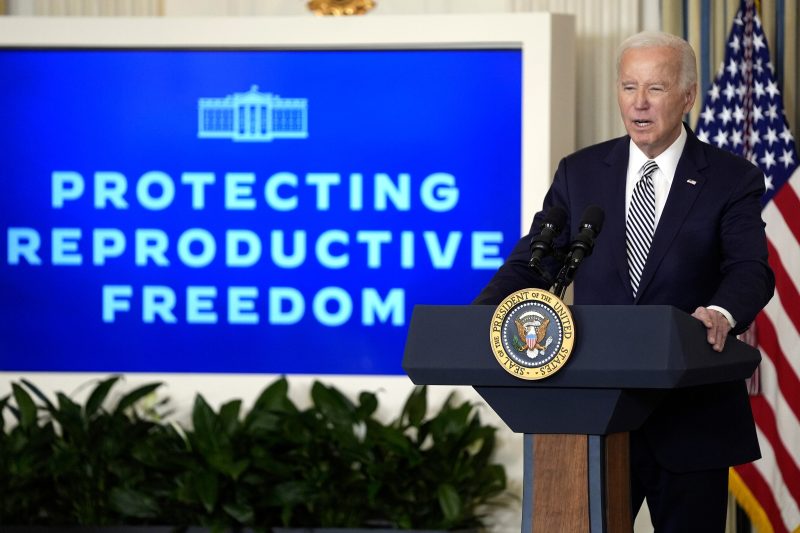
Biden to travel to Florida to rebuke Trump over six-week abortion ban

President Biden will travel to Florida on Tuesday to denounce that state’s six-week abortion ban — just days before the law goes into effect — in his latest push to blame former president Donald Trump for the erosion of reproductive rights across the country.
Biden will deliver remarks on what he has called “reproductive freedom” in Tampa, visiting a state where Democrats have lost ground in recent years but where they see the abortion issue as one that can galvanize voters. It will be Biden’s first major speech on abortion since Trump suggested that the politically volatile issue be left to the states rather than addressed through a federal law.
A range of Democrats have responded by reminding voters that Trump appointed three Supreme Court justices who helped overturn Roe v. Wade, paving the way for strict abortion bans in many states. Biden has chimed in, too, using remarks and ads to pin the fallout from the Supreme Court’s decision on Trump.
Democrats — who have seen the abortion issue mobilize voters in ways that have delivered victories in deeply Republican states such as Kentucky, Kansas and Ohio — are pushing to elevate the issue in other conservative-leaning states in hopes of putting Trump and his fellow Republicans on defense.
“We take Florida very seriously. The idea that Donald Trump has the state in the bag could not be further from the truth,” Biden campaign communications director Michael Tyler told reporters Monday. “He owns not only the state of abortion rights across the country, but he owns the restriction that we’re seeing play out in Florida. So, yes, that means there’s an opportunity for us.”
Earlier this month, the Florida Supreme Court approved a state law that would restrict most abortions after the sixth week of pregnancy.
Trump — who previously suggested the law was “harsh” — came out with his own abortion policy shift on April 8, saying the issue should be left to the states and suggesting that Florida’s law was “probably going to change.” But then the Arizona Supreme Court ruled the next day that an 1864 law outlawing nearly all abortions should take effect — prompting immediate criticism from Trump and some other Republicans.
In Florida, voters will have an opportunity to weigh in on the state’s law since the state Supreme Court allowed a measure that would enshrine abortion rights in the state’s constitution to appear on the ballot. Like other such constitutional measures in Florida, the referendum would need to achieve 60 percent of the vote to pass in November. Trump, a Florida resident, has not said how he would vote on the measure.
Democrats are hoping the ballot issue will drive turnout and make Florida — a state Trump won by 3.3 percentage points in 2020 — more competitive, at least for down-ballot races, if not for the presidency, said Susan MacManus, a political analyst based in the Tampa area.
“It can’t just be about Biden running for president. It has got to also be about Democrats running for congressional and state legislative positions,” she said, adding that while Biden receives low marks from young voters in the state, the abortion ballot measure could help him win additional votes from that key voting bloc.
Biden, a practicing Catholic, has at times struggled to balance his personal beliefs and politics in his public remarks about abortion. During a fundraiser last year, he said, “I’m not big on abortion.”
During a meeting of his top officials at the White House in January, Biden made sure to stipulate that he was not pushing for “abortion on demand,” but rather federal policy that would codify the protections that the Supreme Court justices outlined in their 1973 Roe decision.
Several activists also noted that during the State of the Union address last month, Biden did not utter the word “abortion,” instead skipping over the term in his prepared remarks and opting for alternative language like “reproductive freedom” and the right to “choose.”
Still, Biden and his campaign allies have tried to make abortion a key pillar of their 2024 campaign messaging, after a string of votes in various states have shown strong opposition to strict abortion bans.
Florida, which has trended decidedly toward Republicans in recent years after decades of being the nation’s largest swing state, has been a critical location for abortions in part because it is surrounded by several states with strict bans on the procedure.
More than 80,000 women get an abortion in Florida in a typical year — accounting for about 1 in 12 abortions in the country. In the months since Roe was overturned, many women in the South have traveled to Florida to receive abortions, fleeing restrictions in states like Alabama and South Carolina. When Florida’s new restriction goes into place on May 1, the closest option for someone seeking an abortion may be North Carolina.
Caroline Kitchener contributed to this report.
